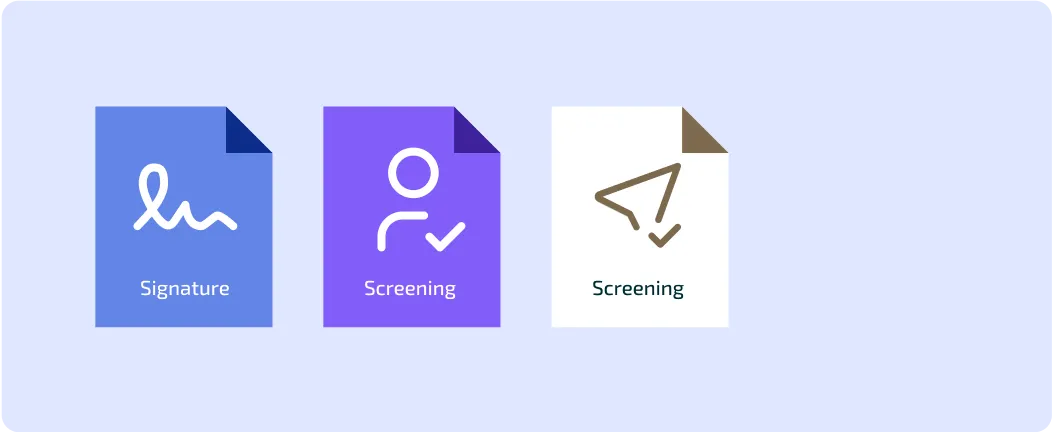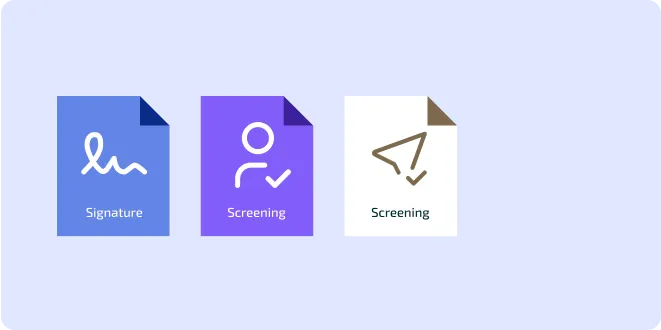.webp)
Published on
April 15, 2025
Identity Verification in the UAE: Processes and Key Insights
In this story

Accelerate AML Compliance: Meet Regulatory Demands with 80% Less Setup Time
.svg)
.svg)
Identity verification has emerged as a cornerstone of modern financial operations, particularly in regions like the UAE, where regulatory compliance with international standards is critical.
In an era marked by rapid digitization and sophisticated fraud schemes, robust identity verification processes serve as the bedrock for anti-money laundering (AML) strategies, fraud prevention, and regulatory compliance. This article delves deep into the nuances of identity verification in the UAE, exploring its regulatory framework, technological advancements, and practical applications for many financial institutions.
What is Identity Verification in the UAE?
Identity verification involves confirming an individual’s identity by cross-checking their provided documents with official records. This process can be carried out using several approaches a) Document Verification b) Database Identification c) Identity Verification Online d) Knowledge-Based Authentication (KBA).
Financial institutions in the UAE are required to identify and confirm the identities of all their customers. This process should generally be completed before a business relationship is established.
However, in specific cases outlined in Article 4.3 of the AML-CFT Decision, where there are no suspicions of money laundering or terrorist financing (ML/FT) and the associated risks are deemed low, verification of the customer’s identity may be completed after the business relationship has commenced.
When verifying an Emirates ID card—whether through physical inspection or using digital and electronic Know Your Customer (e-KYC) solutions, financial institutions must utilize the online validation gateway provided by the Federal Authority for Identity & Citizenship, Customs & Port Security. Alternatively, they can use the UAE Pass Application or other government-supported solutions. A copy of the Emirates ID and its digital verification record, must be maintained. If a passport is used instead of an Emirates ID during the KYC process, a certified copy must be obtained directly from the original document.
Identity Validation vs Identity Checks vs Document Verification
- Identity Validation: Ensuring the authenticity of provided identity information.
- Identity Checks: Verifying an individual’s details against official records.
- Identity Document Verification: Assessing the legitimacy of documents such as passports and Emirates IDs.
Identity Verification Methods in the UAE
In the UAE, various methods are used to verify identities for banking, government services, and more. These methods ensure security and fraud prevention. Here are the main types of identity verification:
- Emirates ID: The Emirates ID is an official ID card required for government services, banking, and official tasks. It includes biometric data like fingerprints and facial recognition for secure identification.
- Biometric Verification: Biometrics like fingerprints, facial recognition, and iris scans are used to confirm identity. These methods are used in government services, banking, and airports.
- One-Time Password (OTP) and Two-Factor Authentication (2FA): OTP is a temporary passcode sent to a phone or email for identity verification, commonly used in online banking.
2FA requires two steps, such as a password and an OTP, for added security.
- Passports: Passports verify the identity of foreign nationals, especially when opening bank accounts or using services that require identification. They may also include biometric data for extra security.
- Smartphone and Mobile Authentication: Smartphones and digital wallets like Apple Pay use fingerprint, face recognition, or PINs for identity verification.
Mobile number verification is also used by sending a code to confirm identity.
- UAE Pass: UAE Pass is a digital ID system that allows users to authenticate their identity online and access government services securely.
- Know Your Customer (KYC): KYC is used in banking to verify identity using documents like the Emirates ID, passport, and utility bills. It helps prevent fraud.
- Digital Signatures: Digital signatures are used to confirm identity in online transactions and legal agreements.
Comply quickly with local/global regulations with 80% less setup time
.svg)
.svg)
Step-by-Step Guide to the Identity Verification Process in the UAE
To comply with national and international AML regulations, these are the steps for identity verifications in the UAE:
1. Submit Personal Information: The first step is providing personal details such as name, date of birth, nationality, and contact information. This can be done via identity verification online or in person.
2. Verify Documents: Standard documents required include the Emirates ID, passport, residency visa, and utility bills. These documents are checked for authenticity.
3. Collect Biometric Data: Biometric data such as fingerprints, facial recognition, or iris scans may be collected for identification, especially when using the Emirates ID or UAE Pass.
4. Use Two-Factor Authentication (2FA): Many services require two forms of verification: a password or PIN and a One-Time Password (OTP).
5. Verify via Digital Platforms: Identity verification may be completed online using systems like UAE Pass, which links Emirates ID and biometric data for secure access to services.
6. Complete KYC (Know Your Customer): In banking and finance, KYC procedures are followed, where documents and personal information are verified to prevent fraud and illegal activities.
7. Cross-Check with Government Databases: Information may be checked against government databases to ensure accuracy and prevent identity fraud.
8. In-Person Verification (if needed): Some services, such as opening a bank account, may require in-person verification, where the customer submits documents and sometimes meets with an official.
9. Monitor for Suspicious Activity: Services may track suspicious activities or inconsistencies in your information to prevent fraud. Additional checks may be requested.
10. Use Automated Verification Systems: Many services use automated systems with AI and machine learning to quickly and accurately verify documents and biometric data.
11. Complete Verification for Specific Services: Certain services, like getting a driving license or accessing healthcare, may require extra steps such as medical tests or additional documentation.
12. Final Confirmation: After verifying documents and biometric data, a final check is done. This may be done online or in person.
13. Approval or Rejection: If all details are confirmed, the customer's identity is approved, and he/she can access the requested services. If there are issues, they may be asked to provide more documents.
14. Regular Updates or Re-verification: Some services may require periodic updates or re-verification, such as renewing your Emirates ID or going through KYC again for banking.
15. Comply with International Standards: Certain services, especially in finance, follow international standards like Anti-Money Laundering (AML) rules. This may require extra checks for high-risk transactions.
Overview of Identity Verification Regulations and Standards in the UAE
In the United Arab Emirates (UAE), financial service providers are required to adhere to specific regulations and standards for identity verification to ensure the security and integrity of their services. These regulations are primarily outlined by the Central Bank of the UAE (CBUAE) and the Federal Authority for Identity and Citizenship (ICA).
1. Customer Identification and Verification
The CBUAE mandates that financial service providers must identify and verify the identities of all customers before establishing a business relationship. This process involves obtaining and verifying original, official (i.e., government-issued) documents whenever possible. If this is not feasible, FIs should augment the number of verifying documents or the amount of information obtained from different independent sources.
2. Use of Emirates ID and Digital Verification
When verifying the Emirates ID card, whether physically or through digital solutions, insurance operators and financial institutions are required to use the online validation gateway of the ICA, the UAE-Pass application, or other UAE government-supported solutions. They must also keep a copy of the Emirates ID and its digital verification record.
3. Automated and Biometric Verification
UAE regulations permit the use of automated and biometric identity verification. Automated solutions should carry out the following steps:
- ID Proofing Check: To verify the user’s identity document is valid and genuine.
- Similarity Check: To match the person and the identity document.
- Liveness Check: To ensure the person is physically present.
4. Know Your Customer (KYC) and Anti-Money Laundering (AML) Requirements
Financial institutions in the UAE are required to implement KYC and AML procedures, which include:
- Customer Identification: Collecting required KYC documents.
- Verification of Identity: Authenticating the provided information.
- Risk Assessment: Evaluating the potential risk associated with the customer.
- Ongoing Monitoring: Continuously monitoring the business relationship for suspicious activities.
5. Government Initiatives
The UAE government has launched the "Know Your Customer" (KYC) digital platform to provide financial institutions with accurate, comprehensive, and confidential data. This platform aims to enhance the efficiency and effectiveness of KYC processes across the financial sector.
When to Verify Customer Identities in the UAE
Identity verification in the UAE is actually something that happens more often than you might think but we're highlighting the most prominent ones here.
The first time a customer comes in to open an account (regardless of the purpose of opening this account) it’s a must-do to make sure you’re dealing with the right person. Also, whenever a customer makes a large or suspicious transaction, you must double-check who they are.
Also, sometimes, a customer’s details change (maybe they move to a new address), and that’s a good time to verify the user’s identity again. Also, the document may expire, so the bank will periodically or in an automated manner track that.
Why Identity Verification Matters for UAE Financial Institutions
There are a few challenges to remember, but the benefits far outweigh the hurdles.
Why It’s Great for Your Institution:
- Staying on the Right Side of the Law: The UAE has pretty strict laws when it comes to money laundering and financial crime. Using strong identity verification helps you follow these rules and avoid any fines or legal problems that could impact your business.
- Stronger Security: The first big win is security. Verifying someone’s identity prevents fraud, identity fraud/theft, and even money laundering. And with the financial scene in the UAE growing so fast, this is essential for keeping things safe and detecting fraud.
- Building Trust with Customers: People are careful with their personal information these days. When they see that you're taking the right steps to verify their identity, it builds trust. And trust is key to long-term business.
- Faster and Smoother Onboarding: Think about how much faster you can get new customers onboard with digital tools like UAE Pass. It simplifies the whole process, not just for you, but for the customer too. Less hassle, more efficiency.
- Supporting Digital Growth: The UAE is really pushing digital innovation. As everything moves online, identity verification becomes the backbone of making digital services safe and secure. It's a key part of keeping everything running smoothly.
But… It’s not without its challenges!
The Challenges:
- The Rules Can Be Complicated: While the rules are there for a reason, sometimes they can feel a bit complex. You’ve got to keep track of regulations and adjust your processes to stay compliant, and that’s not always easy.
- Fake Documents Are Always a Risk: Even with all the great technology, there’s always a chance someone could slip through with fake documents. Fraudsters get smarter, so staying one step ahead is a constant challenge.
- Customers Worry About Privacy: It’s understandable. Customers may be nervous about sharing their personal data, especially online. They want to know their information is in safe hands, so making sure you’re transparent about how their data is used is key.
- International Verification Can Be Tricky: The UAE is a global hub, and with people from all over the world, verifying foreign documents can sometimes be tricky. You’ve got to be extra careful when dealing with international customers.
Read more: What is Customer Due Diligence (CDD): Importance, Types and Checklist
Identity Verification Solution for Financial Institutions in the UAE
Financial institutions in the UAE can leverage the FOCAL Platform to ensure robust identity verification. National ID verification allows businesses to cross-reference an individual’s ID number with official national databases, ensuring the authenticity of the information provided. Commercial registration checks confirm the legitimacy of businesses by verifying their commercial registration through authoritative databases.
IBAN verification ensures that the International Bank Account Numbers provided belong to the correct individuals during the customer onboarding. Using regional authoritative address databases, address verification confirms that the address shared belongs to the individual being onboarded. FOCAL Identity Verification solution collectively enhances the security and accuracy of the identity verification process.
Conclusion
Identity verification in the UAE is a whole system that helps ensure everything is secure, trustworthy and follows the rules. The UAE has put in place some strong tools for identity verification, like the Emirates ID and the UAE Pass, to keep things safe and efficient.
By using the right identity verification methods, you’re not just following the law but also protecting your business and customers from fraud and other risks. This doesn’t just make things secure; it also builds trust, especially as we all move towards a more digital economy.
FAQs
Q1. How do you get an Emirates ID?
To get an Emirates ID, first, you’ll need an entry permit and to complete a medical check. Then, apply for your Emirates ID at the Federal Authority for Identity and Citizenship (FAIC). Once that’s done, you’ll get your residence visa, and that’s how you can officially get your Emirates ID.
Q2. What’s the UAE Pass, and when did it become a thing?
The UAE Pass is a digital ID that was launched in October 2023. It makes accessing services in the industrial sector easier and faster by helping with authentication. So, it’s a big step forward for convenience and security.
Q3. What law protects data security in the UAE?
The Federal Decree-Law No. 45 of 2021 is the law that takes care of data security in the UAE. It sets the rules for how personal data is managed and protects individuals’ rights regarding their information.
Streamline Compliance: Achieve 80% Faster Setup for Fraud Prevention
.svg)
.svg)

How Aseel reduced onboarding time by more than 87% using FOCAL
Learn how FOCAL empowered Aseel to achieve new milestones.
.svg)
.svg)
Mastering Fraud Prevention: A Comprehensive Guide for KSA and MENA Businesses
51% of organizations fell victim to fraud in the last two years, don't be caught off guard, act proactively.
.svg)
.svg)
Featured blog posts
.svg)





AI-Driven Precision in Fraud Risk and AML Compliance
.svg)
.svg)

.svg)
.png)






.webp)




.svg)








%20(1).webp)
Comments
Leave a Reply
Comment policy: We love comments and appreciate the time that readers spend to share ideas and give feedback. However, all comments are manually moderated and those deemed to be spam or solely promotional will be deleted.